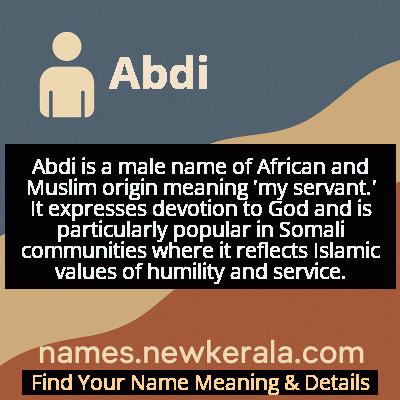Abdi Name Meaning & Details
Origin, Popularity, Numerology Analysis & Name Meaning of Abdi
Discover the origin, meaning, and cultural significance of the name ABDI. Delve into its historical roots and explore the lasting impact it has had on communities and traditions.
Name
Abdi
Gender
Male
Origin
African
Lucky Number
7
Meaning of the Name - Abdi
Abdi is a male name of African and Muslim origin meaning 'my servant.' It expresses devotion to God and is particularly popular in Somali communities where it reflects Islamic values of humility and service.
Abdi - Complete Numerology Analysis
Your Numerology Number
Based on Pythagorean Numerology System
Ruling Planet
Neptune (Ketu)
Positive Nature
Intuitive, analytical, spiritual, and inquisitive.
Negative Traits
Secretive, reserved, aloof, and can be overly critical.
Lucky Colours
Green, yellow.
Lucky Days
Monday.
Lucky Stones
Cat’s eye, moonstone.
Harmony Numbers
1, 5, 6.
Best Suited Professions
Scientists, researchers, spiritual leaders, detectives.
What People Like About You
Depth of knowledge, analytical skills, spirituality.
Famous People Named Abdi
Abdi Bile
Athlete
World Champion in 1500 meters in 1987
Abdi Farah
Artist/Model
Winner of Bravo's 'Work of Art: The Next Great Artist'
Abdi Yusuf Hassan
Politician
Former Deputy Prime Minister of Somalia
Abdi Sinimo
Musician
Pioneer of Somali music and creator of Balwo style
Name Variations & International Equivalents
Click on blue names to explore their detailed meanings. Gray names with will be available soon.
Cultural & Historical Significance
The historical significance of Abdi extends beyond individual identity to represent collective cultural values. During Somalia's oral tradition era, names like Abdi maintained religious continuity despite political changes. The name's endurance through colonization, civil war, and diaspora demonstrates its cultural resilience. In modern Somali communities worldwide, Abdi serves as a cultural anchor, connecting individuals to their heritage while adapting to global contexts. The name represents not just personal identity but also communal belonging and the preservation of Islamic values across generations and geographic boundaries.
Extended Personality Analysis
Individuals named Abdi are commonly associated with traits of humility, reliability, and strong moral character. The name's inherent meaning of 'servant' often shapes personality expectations, with many Abdis being perceived as community-focused individuals who prioritize service over self-interest. They typically exhibit quiet confidence rather than overt assertiveness, demonstrating strength through consistency and dependability rather than dramatic displays. This creates an impression of someone who is deeply principled but not dogmatic, someone who leads through example rather than command.
In social contexts, Abdis are often seen as the stabilizing force in groups—the person others turn to for wise counsel and practical support. They tend to be excellent listeners who offer thoughtful perspectives rather than quick judgments. The cultural expectation associated with the name encourages development of patience, resilience, and practical problem-solving skills. Many Abdis display a remarkable ability to navigate challenges with grace and maintain their composure under pressure. These personality traits reflect the name's spiritual origins while adapting to modern social demands, creating individuals who balance traditional values with contemporary realities.
Modern Usage & Popularity
In contemporary usage, Abdi maintains strong popularity within Somali communities globally while also gaining recognition in multicultural societies. The name continues to be frequently chosen by Somali parents both in the Horn of Africa and throughout the diaspora in Europe, North America, and Australia. While its religious significance remains primary, modern usage shows some adaptation, with some parents using Abdi as a middle name or combining it with more contemporary first names. The global Somali diaspora has introduced the name to new cultural contexts while preserving its traditional meaning and pronunciation. In recent years, the name has maintained consistent usage rather than following dramatic popularity trends, reflecting its status as a cultural staple rather than a fashionable choice. Digital globalization has also increased the name's visibility, with successful individuals named Abdi in sports, arts, and politics helping to maintain its positive associations across generations.
Symbolic & Spiritual Meanings
Symbolically, Abdi represents the profound concept that true strength lies in humility and service. The name embodies the Islamic spiritual ideal of being a servant of God, carrying deep metaphorical meaning about one's relationship with the divine and with humanity. It symbolizes the recognition that all human achievement is ultimately in service to higher principles rather than personal glory. Beyond its religious context, Abdi represents the cultural value placed on community welfare over individual success—the idea that a person's worth is measured by their contributions to others' wellbeing. The name serves as a constant symbolic reminder that leadership emerges from service and that the most meaningful accomplishments are those that benefit the collective. In a broader sense, Abdi symbolizes the integration of spiritual values into daily life, representing how faith and action combine to create purposeful existence centered on service, humility, and devotion to something greater than oneself.

